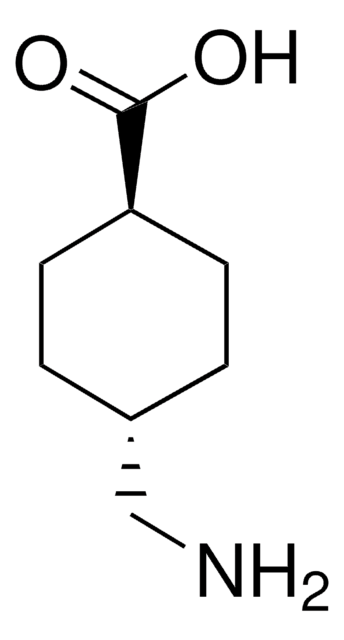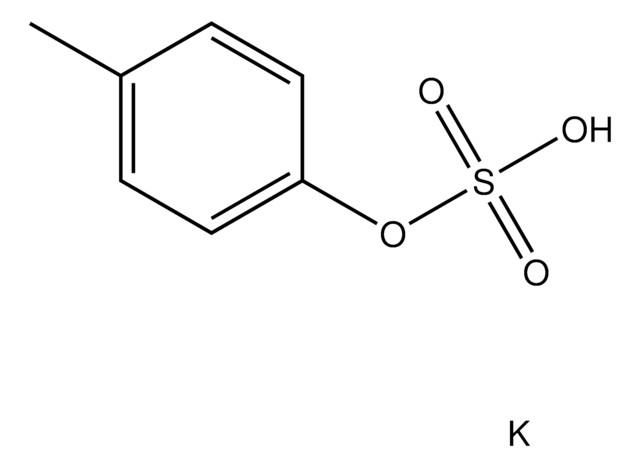96408
N-(2-Phenylacetyl)glycine
analytical standard
Synonym(s):
2-(2-Phenylacetamido)acetic acid, 2-Phenylacetyl glycine, NSC 408424, NSC 92778, Phenaceturic acid, Phenacetylglycine
Sign Into View Organizational & Contract Pricing
All Photos(1)
About This Item
Empirical Formula (Hill Notation):
C10H11NO3
CAS Number:
Molecular Weight:
193.20
Beilstein/REAXYS Number:
1107116
MDL number:
UNSPSC Code:
12352209
PubChem Substance ID:
NACRES:
NA.24
Recommended Products
grade
analytical standard
Quality Level
assay
≥98.0% (HPLC)
shelf life
limited shelf life, expiry date on the label
application(s)
clinical testing
format
neat
storage temp.
2-8°C
InChI
1S/C10H11NO3/c12-9(11-7-10(13)14)6-8-4-2-1-3-5-8/h1-5H,6-7H2,(H,11,12)(H,13,14)
InChI key
UTYVDVLMYQPLQB-UHFFFAOYSA-N
Biochem/physiol Actions
Phenylacetylglycine is an acylglycine. Acylglycines are normally minor metabolites of fatty acids. However, the excretion of certain acylglycines is increased in several inborn errors of metabolism. In certain cases the measurement of these metabolites in body fluids can be used to diagnose disorders associated with mitochondrial fatty acid beta-oxidation. Acylglycines are produced through the action of glycine N-acyltransferase (EC 2.3.1.13) which is an enzyme that catalyzes the chemical reaction: acyl-CoA + glycine ↔ CoA + N-acylglycine. Phenylacetylglycine or PAG is a glycine conjugate of phenylacetic acid. Phenylacetic acid may arise from exposure to styrene (plastic) or through the consumption of fruits and vegetables. Phenylacetic acid is used in some perfumes, possessing a honey-like odour in low concentrations, and is also used in penicillin G production. PAG is a putative biomarker of phospholipidosis. Urinary PAG is elevated in animals exhibiting abnormal phospholipid accumulation in many tissues and may thus be useful as a surrogate biomarker for phospholipidosis. The presence of phenylacetylglycine in urine has been confirmed for dogs, rats and mice. However, the presence of this compound in human urine is controversial. GC-MS studies have not found this compound while NMR studies claimed to have identified it , It appears that phenylacetylglycine may sometimes be mistaken for phenylacetylglutamine via NMR.
Recommended products
Find a digital Reference Material for this product available on our online platform ChemisTwin® for NMR. You can use this digital equivalent on ChemisTwin® for your sample identity confirmation and compound quantification (with digital external standard). An NMR spectrum of this substance can be viewed and an online comparison against your sample can be performed with a few mouseclicks. Learn more here and start your free trial.
signalword
Warning
hcodes
Hazard Classifications
Eye Irrit. 2
Storage Class
11 - Combustible Solids
wgk_germany
WGK 3
flash_point_f
Not applicable
flash_point_c
Not applicable
Choose from one of the most recent versions:
Already Own This Product?
Find documentation for the products that you have recently purchased in the Document Library.
Jane Delaney et al.
Biomarkers : biochemical indicators of exposure, response, and susceptibility to chemicals, 9(3), 271-290 (2005-03-15)
Amiodarone was given to male Sprague-Dawley rats at a dose of 150 mg kg(-1) day(-1) for 7 consecutive days to induce phospholipidosis in the lungs of treated rats. Amiodarone was given alone or concurrently with phenobarbitone. Animals given amiodarone had
M Matsumoto et al.
The Journal of veterinary medical science, 57(2), 205-211 (1995-04-01)
After the urine was treated with urease, lyophilized, and trimethylsilylated, it was examined for metabolic profiles in Dalmatian dogs and Shetland sheepdogs by gas chromatography-mass spectrometry (GC/MS), which simultaneously analyzes organic acids, amino acids, sugars, sugar alcohols, purine and pyrimidine
Xiuting Yu et al.
Experimental and therapeutic medicine, 14(2), 1184-1192 (2017-08-16)
The incidence of inflammatory bowel disease (IBD), characterized by chronic, relapsing intestinal inflammation, has continually increased in recent years. A previous study by our group identified five potential metabolic markers possibly associated with the pathology of 2,4,6-trinitrobenzenesulfonic acid (TNBS)-induced IBD
Resistant Starch but Not Enzymatically Modified Waxy Maize Delays Development of Diabetes in Zucker Diabetic Fatty Rats.
Mette Skou Hedemann et al.
The Journal of nutrition, 147(5), 825-834 (2017-03-17)
Hudan Pan et al.
Frontiers of medicine, 13(5), 564-574 (2019-05-16)
Traditional Chinese medicine (TCM) formulas have attracted increasing attention worldwide in the past few years for treating complex disease including rheumatoid arthritis. However, their mechanisms are complex and remain unclear. Guan-Jie-Kang (GJK), a prescription modified from "Wu Tou Decoction," was
Our team of scientists has experience in all areas of research including Life Science, Material Science, Chemical Synthesis, Chromatography, Analytical and many others.
Contact Technical Service









